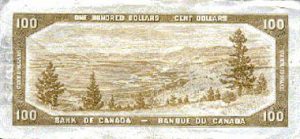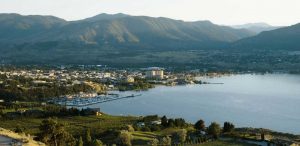Home to me, is where I was born, where I grew up, and the society of that small town. Home is a feeling of safety, of familiarity and of family. Home is a place of belonging, of memory and a part of a history.
Nestled between two lakes, up a hill, and on a quiet cul de sac, is where I consider my home. I was born and raised in the small Okanagan city of Penticton, British Columbia. The scenery is beautiful, the wine plentiful, and quality fruit is always nearby. Munson’s Mountain, The West Bench, Naramata road, and the endless array of orchards and wineries stretch along Okanagan Lake, overlooking the pristine blue that stretches all the way through the valley to Armstrong and Vernon. There is a cemetary, in town, where my grandfathers are buried, overlooking the lake. The view was once put on the Canadian $100.00 bill. I’d like to think my grandfathers approve of their placement.

Neither of my parents were born in Penticton. My father comes from Swift Current, Saskatchewan and my Mother from Richmond BC. Both of them moved to Penticton when they were very young and grew up there. Both attended Middle School and High School there. My mom attended the same Elementary School as myself and my siblings. We had many of the same teachers. My family still lives there, and my sister’s kids are going to school there too, completing the same education with many of the same teachers as the rest of us.
When one lives in a small city, the whole city becomes your backyard and all its residents, your neighbours. My childhood was unremarkable. I played with my friends, biked along the old rail-road tracks, spent endless days at the beach, playing in the water and relaxing in the sand. I was very active in the theatre scene and was routinely cast in summer Shakespeare plays held at different wineries throughout the valley. It was impossible to avoid people, and rumour could get out of hand quickly.
The fertile land and many orchards has ruined fruit for me, as now my standards are very high. When biting into a peach and the juice doesn’t run down your chin, it’s a bad peach and is tossed away. The same goes for apples. Home is the feeling of a perfect bite of a peach. In the summer, the orchards of cherries blossom, and everywhere you look vendors are selling their fruit. My favourite were always the apricots from Jassar fruit stand, a five minute walk from my childhood home. Mr. Jassar always gave me extra because he knew I loved the apricots so much. It is this connection to the people back home that makes me feel like I belong there.
The final week of August is the city’s annual celebration, Peach Fest. This celebration lasts a week and there are musicians and vendors and performers presenting their skills and wares. Fireworks shows happen at dark over the lake, antique cars are lined up along the beach and everyone is selling fruit. Originally, Peach fest was a celebration of the harvest, but now the importance of the harvest has dwindled and it is just an excuse to celebrate with the whole city, but knowing the reason for the celebration helps me to feel like I belong there.
Penticton, in the traditional tongue of the Syilx people, an interior Salish tribe, means “a place to stay forever”, and although I do not live there now, my heart is there with my family and fond memories of childhood. Perhaps one day I will return permanently once I’ve made my mark in the world.
My home is the traditional territory of the Sylix people, now known as the Penticton Indian Band, but the land was colonized by Tom Ellis in 1866 when he moved into the valley to start his orchards and cattle ranch. The whole of Penticton was “given” to the PIB as part of a reservation, but government officials realized the land between the lakes was excellent and the reservation was shifted to the west side of the Penticton River Channel where the Penticton Indian Band Reservation currently lies. This still causes a lot of tension between the city of Penticton and the PIB.
Racism in Penticton, I’m ashamed to say, is still prevalent against the PIB. Agreements in city counsel are routinely blocked and requests from the PIB are ignored. I’ve heard racial slurs being hurled at our First Nation’s neighbours, with startling frequency.
We were not taught about the culture of the Syilx people in school at all and so the only time we would go onto the reservation was to drive up Apex mountain toward the ski hill. The signs on the reservation were written in the traditional Syilx language and seemed magical and foreign to me. My home is split between two cultures.
My father is a wildlife biologist for the provincial government, and has many friends in the Penticton Indian Band and had met their chief a few times. One day, we were invited to a traditional Potlatch held on the reserve. They told stories, and beat drums and danced in traditional costumes and we all ate together dishes of smoked salmon. It was the most incredible experience and the memory is vivid even now. I remember feeling out of place because I didn’t know the language, even though they translated the stories. I remember thinking “I was born here too, how come I don’t know the language.” That question still bothers me, but I worry acting on my interest in Syilx language is inappropriate as I am not part of that nation. I have been told there is a Syilx language school in Penticton, perhaps that would be something to look into if ever I return permanently.
What does it mean to be at home? My experience, being born in Penticton and growing up there, isn’t the same as members of the PIB. We live in the same town, attend the same festivals, go to the same schools, and yet our culture and our language are different enough that a young boy of 10 could be enthralled and mystified at the potlatch ceremony and experience something completely inconceivable and long lasting.

Penticton over Okanagan Lake
I’ve taken some information from Wikipedia on the history of Penticton. Check it out here
Works cited
“Thomas Ellis (Irish Emigrant)”. En.Wikipedia.Org, 2019, https://en.wikipedia.org/wiki/Thomas_Ellis_(Irish_emigrant).
“Penticton”. En.Wikipedia.Org, 2019, https://en.wikipedia.org/wiki/Penticton.

Oh, how beautiful, Sean. I wish I had some fresh fruit to eat right now.
Just thought I’d comment to encourage you to pursue your interest in learning the Syilx language, if there are ample opportunities and resources to do so. Otherwise, you could commit to offering some financial support to enable youth to learn their language first, or to support language documentation and revitalization efforts before learning yourself. Language is such a special way to connect more deeply to place.
Slowly, I’m learning some Cree from my kookum (that’s grandma in Cree). Her mother only spoke Cree, her father only spoke English, and it’s been with the encouragement of her granddaughters that she’s been practicing and remembering her language, which she was shamed and scolded for speaking as a child.
May we raise up and honour Indigenous languages!